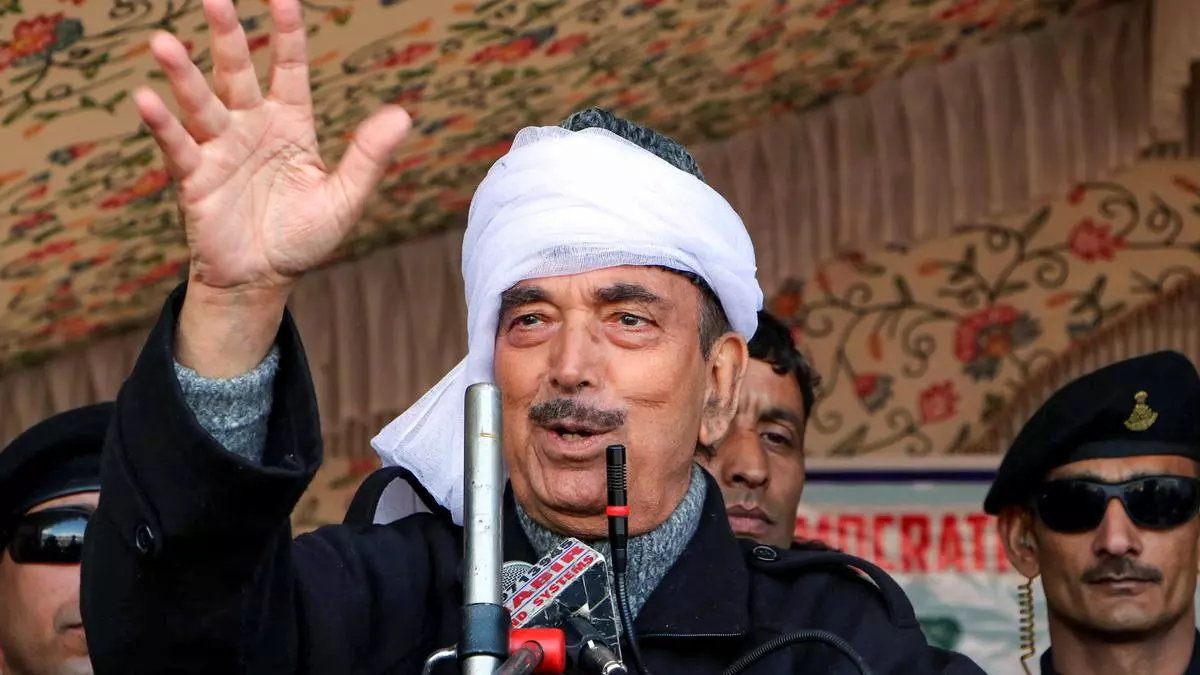Former Chief Minister Ghulam Nabi Azad’s entry into the fray in Anantnag-Rajouri Lok Sabha seat on Tuesday adds an interesting dynamic to the contest in this constituency where demographic and socio-cultural change after the recent delimitation has — for the first time — made the BJP a plausible contestant in the Kashmir Valley.
The Democratic Progressive Azad Party (DPAP) announced its chairman Ghulam Nabi Azad as the party nominee from Anantnag-Rajouri seat on Tuesday. However, in the Valley, Azad’s DPAP is viewed as the proxy of BJP and there has been a strong belief that the party may forge an alliance with newly-floated Jammu and Kashmir Apni Party (JKAP) and Sajad Lone Peoples Conference.
“Both the parties have not announced their candidates yet, there is a possibility that Azad’s candidature may be supported by them,” said a Kashmir-based political analyst.
Azad had floated his party after resigning from the Congress in 2022. In the 2014 Lok Sabha elections, Azad lost to BJP leader Dr Jitendra Singh from Udhampur Lok Sabha seat. It was the first time when Azad was contesting from his home constituency. This time, however, he chose the newly carved out seat to make his debut.
Valley gambit
This constituency, previously known as Anantnag Lok Sabha seat, comprised four south Kashmir districts — Shopian, Anantnag, Pulwama and Kulgam — before its delimitation. However, the re-mapping of electoral constituencies by the Delimitation Commission in 2022 led to the merger of Rajouri and Poonch districts with the Anantnag Lok Sabha seat, while linking Pulwama district and one assembly segment of Shopian district with Srinagar Lok Sabha seat. It now spans over 18 Assembly segments, seven in Jammu and 11 in Kashmir. This newly-carved constituency with a voter population of over 14 lakh — which will go to polls in the third phase on May 7 — was earlier a People’s Democratic Party’s (PDP) stronghold, sending top party leaders such as Mufti Mohammad Sayeed and Mehbooba Mufti to the LS. In 2019 LS elections, the National Conference (NC) wrested control of the seat and a Kashmiri, Hasnain Masoodi, was elected MP from this seat.
However, the addition of Jammu division’s Rajouri and Poonch districts to Kashmir’s Shopian, Anantnag and Kulgam districts adds a new demographic dynamic to this constituency that favours the BJP. The population now consists of approximately 6,00,000 Gujjars and 5,50,000 Paharis. Both the ethnic groups have traditional rivalry between them. The BJP dispensation included the Pahari-speaking people in the Schedule Tribe category. While this widened the yawning chasm between the two communities, it certainly created a new political dynamic here in favour of the BJP which is riding on its popularity among the Pahari voters.
High stakes
The Paharis are inclined towards the BJP while the Gujjars may prefer non-BJP parties. Given this dynamic, the NC on Monday announced veteran Gujjar leader Main Altaf as its candidate for the seat. The PDP, the Congress and the BJP have yet to decide on their candidates.
According to Rekha Choudhary, an expert in identity politics and former professor at University of Jammu, the Anantnag Lok Sabha seat has transitioned from being an all-Kashmir constituency to a J&K constituency. “The BJP government’s recent move of granting Schedule Tribe status to Pahari-speaking people could help the party in gaining a toehold in the Valley. It is bound to enhance the party’s electoral prospects,” the academic said.
